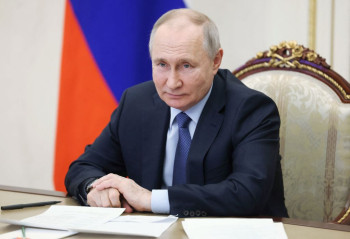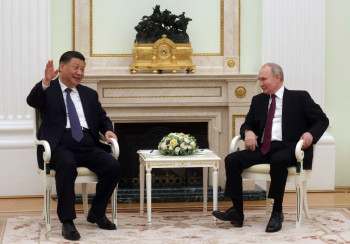Hungary prevented European Union member states from releasing a joint statement on the International Criminal Court’s (ICC) arrest warrant against Russian President Vladimir Putin, Bloomberg reported, citing sources privy to the information.
As a result, EU top diplomat Josep Borrell instead released a statement under his own name, mentioning the ICC’s decision.
“The EU sees the decision by the ICC as a beginning of the process of accountability and holding Russian leaders to account for the crimes and atrocities they are ordering, enabling, or committing in Ukraine,” Borrell said in the statement.
According to Bloomberg, Hungary “wasn’t immediately able to respond to a request for comment.”
The ICC issued an arrest warrant on March 17 for Putin and Maria Lvova-Belova, the Russian official allegedly overseeing the forced deportations of Ukrainian children to Russia -- a move that President Volodymyr Zelensky called “historic.”
The arrest warrant was met with resistance in Russia.
Former Russian President Dmitry Medvedev threatened a missile strike against the Hague following the announcement. “It’s quite possible to envision a scenario where a Russian ship stationed in the North Sea could strategically strike the Hague courthouse with a hypersonic Onyx (cruise) missile,” he said.
On March 20, Russia’s Investigative Committee reported that it had opened a case against members of the ICC for issuing the arrest warrant against Putin.
Budapest has resisted several multilateral efforts at supporting Ukraine amid Russia’s full-scale war. The Hungarian government has repeatedly criticized EU sanctions against Russia, citing their negative impact on the European economy.
In late February, Hungarian Prime Minister Viktor Orban threatened to veto the extension of EU sanctions against Russia, which must be renewed every six months. Hungary also reportedly opposed a proposal, backed by all other EU member states, to prolong the extension period from six to 12 months.
On Jan. 27, Orban told state radio that Budapest would veto any EU sanctions against Russia related to nuclear energy, saying such sanctions are “out of the question.”
In a controversial visit to Minsk on Feb. 13, Hungarian Foreign Minister Peter Szijjarto met with his Belarusian counterpart Sergei Aleinik, saying the “channels of communication must be kept open.” The visit took place a few days after European Commission President Ursula von der Leyen said the EU would impose additional sanctions on Minsk for its role in supporting Russia’s full-scale war.











